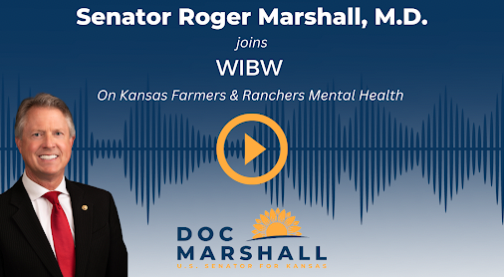- September 20, 2023
ICYMI: Senator Marshall Joins WIBW To Discuss Ag Mental Health Awareness Campaign
Washington, D.C. – U.S. Senator Roger Marshall, M.D. joined WIBW this morning to discuss Senator Marshall’s Ag Mental Health Awareness campaign, which is intended to bring attention to the mental health resources that are available to farmers, ranchers, and our rural communities.
Working in agriculture presents unique challenges and stressors that can contribute to poor mental health outcomes in rural Kansas communities. Senator Marshall’s ongoing campaign is highlighting how Kansans can recognize someone in need of support and where to turn for help.
If you or someone you know is experiencing a mental health crisis or contemplating suicide, 9-8-8 is the Suicide & Crisis Lifeline. The average wait time to be connected in Kansas is less than 21 seconds.
You may click HERE or on the image above to listen to Senator Marshall’s full interview.
Highlights from Senator Marshall’s interview include:
On his Ag Mental Health Awareness Campaign:
“I just hope that every farmer and rancher out there knows that they’re not alone, that we understand the pressures that they’re under. September is National Suicide Prevention Month. And suicide, believe it or not, is a bigger killer than farm accidents are out on the farm and ranch, it’s one of the top killers for young farmers and ranchers.”
“We talked about the drought. But along with that is the interest rate, and just not the interest rate. But how fast the interest rate has gone up. Input costs have gone up as well. So these pressures are very real, we understand them. And then we want others to be a good neighbor, we want folks to start realizing what it looks like. Maybe some of those signs and symptoms when you see one of your neighbors, your family members struggling, and that there’s help out there.”
“This is very real. Again, the stressors have never been greater financially, this may be one of the toughest, if not the toughest this year since the 1980s for farmers and ranchers to make it and again, I think just to do a little education for your listeners out there.”
“But what you’re going to see is a person that’s having problems sleeping, they’re waking up in the middle of the night, typically, and they can’t go back to sleep. And that early on, that person may complain to you that, ‘gosh, I’m just really tired, I can’t sleep anymore.’ That’s a cardinal sign that they need to go see their doctor, you know, maybe they’ve dropped out of your card group. Maybe they dropped out of going to church, they’re not going to the high school football game. Be a good neighbor. Invite that person back to your card group, invite them back to Sunday school, ask them how they’re doing. Try to go do something with them, and just communicate.”
Update on the 2023 Farm Bill:
“Right now. It’s just it’s strictly a money issue. On the stamp programs and nutrition programs, the 2018 Farm Bill thought we’d be spending $65 billion a year on food programs. Right now we’re spending like $180 billion a year on food programs. So inflation is impacting the Farm Bill in many ways.”
“The food programs are taking such a large part of the Farm Bill, there doesn’t seem to be as much money left for what the real Farm Bill is originally about. And that’s to pay for crop insurance and the Title One program.”
“And 80% of [the Farm Bill] is going to go to food programs, or maybe 5% to some conservation programs… If we’re going to call it a Farm Bill, we need to make sure the farmers and ranchers are being taken care of.”
###

